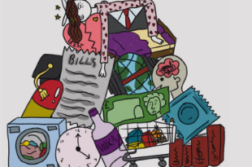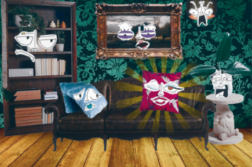Disclaimer: The views expressed within this article are entirely the author’s own and are not attributable to Wessex Scene as a whole.
From a young age, it was made clear that I didn’t fit conventional stereotypes of what made someone ‘pretty’. I was often described as funny, smart, interesting, but never pretty . While other girls were being celebrated for being ‘cute’ and ‘pretty,’ I was being celebrated for my personality or intelligence.
‘Pretty’ is, of course, subjective, but regardless of that fact, stereotypical beauty revolves around being slim, white, able-bodied and cisgender. The more qualities you possess that fit into these categories, the more likely you are to be seen as pretty, and to subsequently benefit from that prettiness.
Pretty privilege works in many ways and can differ depending on what spaces you enter. As a white, cis woman, there are spaces in which I might be perceived as more attractive than a person of colour, or someone who is gender non-conforming. However, being short, fairly chubby, and disabled will impact how I am perceived in different spaces. Different privileges intersect, and attractiveness is just one of many privileges.
Whiteness is heavily tied to attractiveness. Whiteness is something provides people with more opportunities because they’re seen as more attractive. The interconnection of race and beauty has long-since been established, and people of colour are heavily impacted by colourism and westernised ideals of beauty. You simply have to take a look in a magazine to recognise that whiteness is valued over other ethnicities.
Pretty people are granted different and oftentimes, better opportunities than those society deems as less attractive, and that just isn’t fair. Research shows that white, cisgender, slim, conventionally attractive people are more likely to succeed in school and workplace environments. Employers are more likely to want to hire pretty people, and attractive students are more likely to receive higher grades, be more popular and be perceived as smarter. People who are attractive are less likely to be found guilty and are sentenced less harshly in court.
In my experience, weight and body shape have always impacted my life and how people see me. I’m sure most people have felt at times that they look too chubby, or wish that they had a slimmer physique, and can relate to my experience. Growing up as a fat kid, I always felt like the odd one out amongst my mostly slim friends. Although my childhood and teenage years were littered with name-calling, body-image issues, and yo-yo dieting, I’m lucky to have made it out the other end reasonably unscathed (thank you, Tracy Turnblad, ‘Fat’ Amy, and Lizzo).
Obviously, I don’t blame my pretty friends for always getting the attention of the cute boys in class or for winning ‘best hair’, or ‘best outfit’: it wasn’t their fault. This isn’t a call-out to all the conventionally pretty people out there, even if I envy you sometimes. No one should feel bad about the way they look and as someone who has experienced first-hand how it feels to be picked apart because of your appearance, I’m not going to inflict that on someone else. What’s important is understanding that if you are not in a position where you know how it feels to be picked on or made to feel insecure about the way you look, then you are not in a position to deny pretty privilege or any privilege for that matter.
The acknowledgement and understanding of your different levels of privilege are fundamental to eradicating ignorance and making society a more welcoming environment for all people regardless of the way they look.



